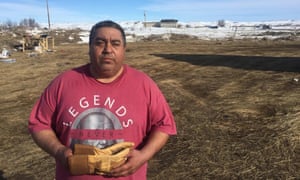Go to Original
By Sam Levin
Aubree Peckham darted through the hallways of the casino, desperate for answers. Word had spread that day in early February that federal agents had arrested Standing Rock activist James White at the Prairie Knights resort in North Dakota, sending his friends and relatives into a panic.
“Everyone was sobbing, running around from room to room, trying to get better information,” said Peckham, a 32-year-old Mescalero Apache woman who has been fighting the Dakota Access pipeline since last year. “Our brothers and sisters are being snatched right in front of us.”
White, who goes by the name Angry Bird, is one of at least six Native American activists now facing serious federal charges tied to the nearly year-long fight against the Dakota Access pipeline.
Demonstrators at the anti-pipeline camps in Cannon Ball, North Dakota, now fear that the US justice department’s recent round of arrests and warrants is the beginning of an aggressive prosecution effort by Donald Trump’s administration.
After Trump ordered expedited approvals of the $3.7bn pipeline in late January, the oil corporation was able to resume drilling across the Missouri river and has said its pipeline could be operational within 30 days. Hundreds of activists, known as “water protectors”, have vowed to keeping fighting the project on the ground, but state officials have said they would soon be evicting the camps.
On top of the growing spectre of imminent defeat and a resurgence of police violence, many are now grappling with federal court cases that could destroy the lives of activists who have dedicated months to protecting the Standing Rock Sioux tribe’s water, sacred grounds and treaty lands from the pipeline.
“We cannot afford to let them treat us like properties of the state,” said Ollie, a 24-year-old water protector whose partner Michael Markus, known as Rattler, was recently taken into custody by federal officers. “That’s what the reservations were in the first place.”
Ollie, who is Eastern Cherokee, Sicilian and Greek, did not want to use her full name out of fear for her personal safety. She is one of many loved ones and friends of five indigenous men who recently faced a federal grand jury indictment on charges of civil disorder and use of fire to commit an offense.
The charges against Rattler, Angry Bird and three others could carry up to 15 years in federal prison and stem from a standoff with police on 27 October 2016during which law enforcement deployed armored vehicles and pepper spray and ultimately arrested 141 people. Although local law enforcement have made roughly 700 arrests since last year and filed a wide range of state-level felony charges, the DoJ prosecutions have dramatically heightened anxieties.
Attorneys and activists said they were particularly concerned given the timing of the indictment – months after the incident but less than two weeks after Trump’s inauguration. Trump has invested in the oil corporation and taken donations from its CEO. The Guardian also recently reported that an FBI terrorism task force is investigating Standing Rock activists.
A spokesman for US attorneys office declined to comment.
“I just want to see my dad,” said Smokey, Angry Bird’s son, who also did not want to use his full name. On a frigid morning, seated inside a crowded tent at Oceti Sakowin, the main indigenous campsite near the pipeline, he said he was struggling to make sense of his father’s detention. “It don’t make no sense bringing charges for things that happened last year. They’re trying to accuse them of being ringleaders. But they’re not. There are no leaders.”
Sandra Freeman, attorney with the Water Protector Legal Collective, who is representing Rattler, said he was being prosecuted under a law that is rarely used in federal court, passed in 1968 to control the Black Liberation Movement and Vietnam war protests. She said the charges were clearly meant to repress free speech rights.
“Law enforcement tactics started escalating and markedly changing in January,” she said. “It was no longer a confrontation at demonstrations, but single people being picked off, being brutalized and being interrogated. In general, it’s law enforcement out of control.”
But federal agents have said that the men set fires to barricades separating police and demonstrators on 27 October.
Ollie said: “They’re going after Rattler to make him a poster child and a scapegoat. He’s never done anything violent. He’s nothing but a gentle giant.
The couple met at camp last year when they worked together as akicita, a Lakota word that water protectors used for one of the security teams. “Rattler’s purpose of being at camp was to make a safe space for people.”
Rattler, who is Lakota Oglala and a US Marine veteran, has also consistently been cooperative and compliant with law enforcement, according to Ollie, who noted that he willingly turned himself in on a state warrant and that the two of them recently paid a $10,000 cash bond so he could be released. But instead of letting him leave after his Morton County hearing, federal agents took him into custody, she said.
“I felt safer having guns pointed at me at close range than going into court,” she said, noting that she now constantly checks to see if there is a warrant for her arrest and refuses to travel alone.
Some fear the defendants won’t get fair juries and trials in Bismarck, where most residents are white.
“They all already have in their minds that all the water protectors are a bunch of rioting and out-of-control criminals,” said Michael Fasig, an Oglala Lakota man who is facing state charges and vehemently denies the allegations. “I want to show the jury the actual truth, the actual facts … But we’re going through their system.”
The slew of cases against activists has also fueled prejudice and racism toward indigenous people in North Dakota, said Anthony Gazotti, a 47-year-old Apache man. While helping set up a new camp site, he recounted the discrimination he faced at a supply store in Mandan, an hour north of Cannon Ball.
“You could just see the disdain and disgust on their face … just because they assumed I was with the water protectors” he said, in tears. “It hurts. It’s lies. These are some of the best people I’ve ever met.”
Ollie said it seemed clear that the federal cases were aimed at killing the momentum of Standing Rock, which inspired an unprecedented gathering of indigenous people from across the globe.
“They are trying to disempower this movement. They do this purposely to break us down,” she said, noting that the detainees were not leaders, since the indigenous groups don’t operate with clear hieracrchies.
Some supporters have compared Rattler and Red Fawn Fallis, another demonstrator taken into custody last year, to famous indigenous protesters like Leonard Peltier, whose activism has led to decades of federal incarceration.
But Ollie said she refused to think that way: “He’s not convicted. We can’t let them become the next political prisoners.”




No comments:
Post a Comment